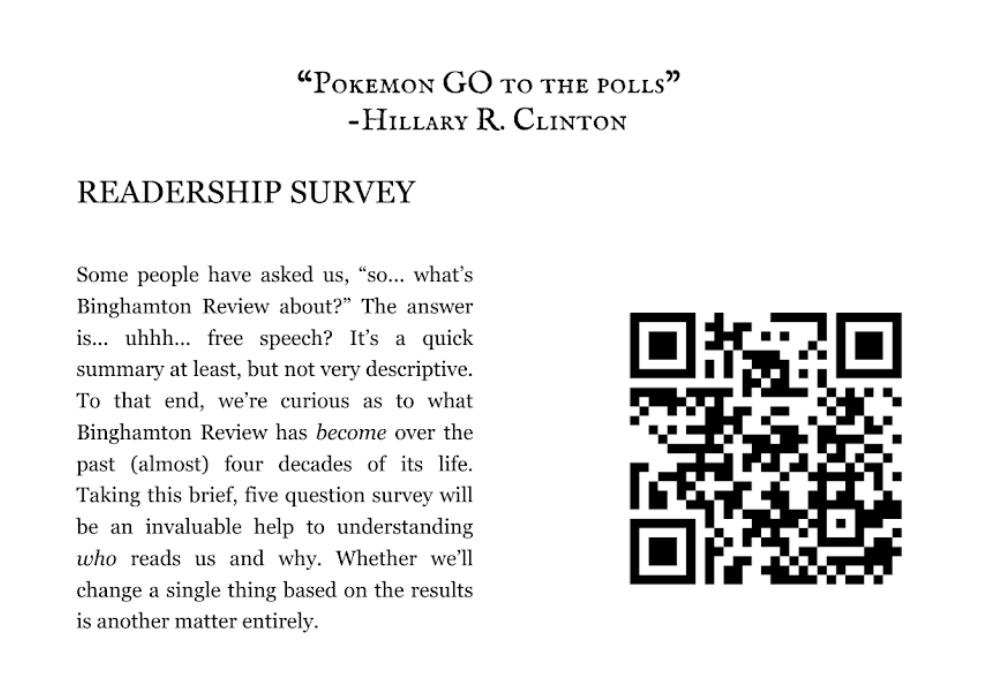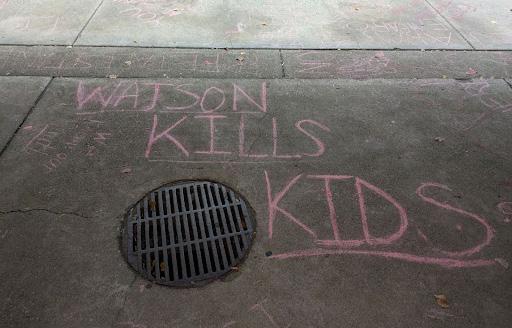





Dear Readers,
Heyyyyy! Why don’t you call me anymore? I know we were on fall break, but did that mean WE were on a break?!? Anyway, do the survey and please come to our meetings. I’m desperate
Also, I hope you all enjoy the Stim Issue!

Sincerely,

Aiden Miller

Binghamton Review is a non-partisan, student-run news magazine founded in 1987 at Binghamton University. A true liberal arts education expands a student’s horizons and opens one’s mind to a vast array of divergent perspectives. The mark of true maturity is being able to engage with these perspectives rationally while maintaining one’s own convictions. In that spirit, we seek to promote the free and open exchange of ideas and offer alternative viewpoints not normally found on campus. We stand against dogma in all of its forms, both on campus and beyond. We believe in the tenents of free expression and believe all sudents should have a voice on campus to convey their thoughts. Finally, we understand that mutual respect is a necessary component of any prosperous society. We strive to inform, engage with, and perhaps even amuse our readers in carrying out this mission.
Views expressed by writers do not necessarily represent the views of the publication as a whole.
I offered to give you all life advice. These were your questions.
Head?
A header is a file that includes all the necessary libraries, function prototypes, and preprocessor directives. Header files end in .h, unlike function and program files, which end in .c or .cpp. If you have any other questions about programming, feel free to reach out at sexgod420@hotmail.com
What if we kissed in the Gender Bender closet?
The Genderer comes out and goes, “Gender me this, Batman,” and then Joker 2s you all over the place.
Have you heard the DiMaggio is back?
It’s what?

Will God forgive me if I put down a green 6 on a blue 9 and no one notices?
As long as you don’t do it three times in a row, you should be good.
It’s been 2 whole years why the FUCK don’t I have any friends?
You’re the guy who wears the ahegao hoodie around campus, aren’t you?
R. Kelly Costume for Halloween?
If you can sing like him, go ahead
Frank Ocean son or Bad Bunny daughter?
Maroon 5 they/them child
Should I drop out and join the Marines?
If you do, activists will accuse you of killing Palestinian
Written by our Staff
children. If you stick it out with your CS classes, they’ll also accuse you of killing Palestinian children. So it really just depends on what you want to do.
Why can’t I join the Rugby team
Never had the makings of a varsity athlete.
Do you think the moon landing was real or fake?
People were too dumb in 1969 to send people to the moon.
Did Diddy diddle on his little diddler till he diddled?
GUYS STOP ASKING US DIDDY QUESTIONS IT’S NOT FUNNY ANYMORE!
My roommate is taking a shower and I’m tempted to knock on the door and ask “Got room for one more?” like Samuel L. Jackson in that one movie.
Do it. You’re only in college once
Can Kanye be forgiven?
Only if he says he was doing it for the bit. Was Kanye doing it for the bit?
No
But didn’t he make Graduation?
Yeah
So can he be forgiven then? Eh, sure, why not Really?
Nah
Does the Wendy’s Krabby Patty conform to the Spongebob lore?
No idea. Do you think I know the Krabby Patty formula? That shit’s impossible to get your hands on. Believe me, I’ve tried.
Go bald or never talk to your family again?
They’re cool and all, but once that hairline starts moving, it’s OVAH. So I’ll go with the former.
Trip to Jamaica or Puerto Freako?
Puerto Freako so I get a “Happy Gilmore” powerful enoughto see God.
Need life advice? Email manager@binghamtonreview.com for more wacky, quirky, and zany responses.
Written by our Staff




By Aiden Miller
In an era where creativity and expression are preached, refinement culture has leaked into nearly every crevice of society. The smoothed-down sameness and polished aesthetics of refinement culture have affected everything from corporate logos to regional accents. The recent redesign of the Minnesota state flag in May of 2024 and the newly redesigned PayPal logo reminded me of the classic Henry Wadsworth Longfellow quote “Simplicity in character, in manners, in style; in all things the supreme excellence is simplicity.” In the last two decades, striving towards excellence through simplicity has been the key to modern design, especially in corporate design. However, the refinement movement of the 2000s, 2010s, and 2020s is characterized by the flood of boring, vanilla, and soulless logos churned out by many of the largest corporations in the world. Refinement needs to end before creativity and artistic expression are rendered obsolete, like a beautiful diamond polished so extensively that it turns into dust.
Soul-sucking corporate refinement has led to many companies ditching their unique and iconic logos for simplistic redesigns that resemble size 60 Arial font plastered on a brightly colored background. In many sectors of the corporate world, artistic expression has been quashed and mass uniformity has become the new norm. This strive toward refinement has left many graphic and corporate designers, who are wonderfully talented and creative, wondering if sacrificing their artistic expression for a steady job in corporate design is worth it. The risks of leaving corporate design are high—job listings for artists are rare and art is a volatile business venture—but many are willing to make that leap.
Well, how bad has it gotten? Since it’s been the topic of heated discussion, let’s take a look at the newly redesigned PayPal logo:


PayPal already had a sleek modern design that was unique and separated it from many of the other corporate logos. It was truly one of the last of its kind. The new logo looks like someone took bolded Arial font and plastered it on a Megamind-blue background. Perhaps PayPal’s C-suite and corporate artists thought using this “provocative” color would be their way of expressing their uniqueness in the already bleak refinement era of corporate design. Sadly, the design just absolutely stinks. PayPal is only the latest victim in a series of artistic serial murders.
Websites like the music streaming platform Spotify, shopping platforms eBay and Pinterest, and the rental company Airbnb changed their funky logo fonts of the past to bland block text that closely resembles the fonts high schoolers mess with when making a presentation for class. This phenomenon even shifted to the fashion industry with iconic brands like Burberry and Saint Laurent scraping their iconic fonts and logos for default Google Docs text.

These artistic atrocities aren’t mutually exclusive to big-money corporations—many U.S. states are experiencing an identity crisis, with refinement culture at the heart of the matter. In 2022, the Minnesota Legislature established a commission to propose new state flag and seal designs. In December 2023, the commission selected the current state flag and state seal after months of deliberation. Below is a comparison between the old and new state flags and seals:




I get that the previous state flag was not really a design, but just the state seal pasted on an indigo-ish background. However, the new flag doesn’t do the state any justice. According to the state, the dark blue shape on the left resembles the shape of Minnesota with the North Star in the middle of the state. On the right, the light blue symbolizes “the abundant waters that help define the Land of 10,000 Lakes.” The Commission’s abstract, yet simplified design misses the mark completely. The flag is quite boring and lacks any character at all. At least the old flag had an interesting and unique seal that showcased the many aspects of Minnesotan life.
Despite the Commission slaughtering the new state flag, the state’s new seal is comparable to a model getting plastic surgery and looking too polished and fake. The human elements of artistic expression were sucked straight out of the new seal, leaving us with a moderately decent design lacking any ounce of character and creativity. The new seal is so cookie-cutter that you would think an AI art module whipped it up (it might have, who knows). One of the true leaders in pushing
these refined styles of flag design is r/vexillology. I could write a whole article about them, but instead, I’ll encourage you to surf through their state flag redesigns and see for yourself (there are occasionally some diamonds in the rough). The reaches of refinement culture also aren’t confined to flag designs and corporate logos. Cars are designed to look monotonous, with matching colors and similar body shapes. Fast food architecture has made every building from McDonald’s to Burger King look similar in style, often forgoing fun colors and play pens for digital registers and color palettes that resemble a hospital bathroom.
Art and personal expression are at the heart of human nature, and refinement culture is slowly eating away at the very things that make us human. As the world moves toward simplicity and perfection through refinement, we lose the creativity and joy often found through art and design. Whether it’s state flags, corporate logos, cars, or architecture, creativity and expression are under attack. Will we be the ones to stop it?
Cut out to redeem rewards.


By Liam Steele
It was the 70s: An era where quality music was as inspired by turbulent global affairs as it was by the soup of drugs within the artists’ veins. All of your dad’s favorite bands had their greatest hits in these years; from the Beatles to the Rolling Stones and Doobie Brothers, there is no denying this period was integral to the history of music as we know it today. While many of these groups leaned their lyrics towards love, peace, and an end to the war (which one, am I right?), one duo, in particular, leaned into humor and cynicism, embracing less favorable subject matter with lyrics to be imposed upon their studio-perfect jazz-rock fusion tracks.

Steely Dan (look up the origin of the group’s name at your own risk), comprised of lead singer and pianist Donald Fagen and guitarist and bassist Walter Becker, was formed when they were recent Bard College graduates, tired of unsuccessful songwriting work in both NYC and California. Facing an industry not understanding of their overly intricate and strange compositions, Becker and Fagen formed a band with fellow bard college friends Denny Dias, Jeff “Skunk” Baxter (Fun fact: this guy is now a defense consultant for the U.S. Congress. Seriously.), Jim Hodder, and David Palmer. The lineup was never the same for long, and this original formation would eventually disband, leaving Becker and Fagen to work with all sorts of famous session musicians to make their music, like Bernard Purdie, Chuck Rainey, and Michael McDonald. If any of these names don’t sound familiar, I urge you to also check out their work, McDonald especially. Mcdonald and Baxter were both a part of the Doobie Brothers as well; another group with immaculate compositions.
The main characters of most Steely Dan songs fall under three categories; unfortunate and powerless, unfortunate and embracing it, and well, just straight-up bad people. This sounds dreary, I know, but the songs around these characters are beautifully composed with solid and humorous lyrics. Seriously, no other group could make me sing “Drink scotch whiskey all night long and die behind the wheel!” (from Deacon Blues) with gusto quite like the Dan can. While the artists that worked with them were ever-changing, the offbeat and sarcastic themes of the Dan’s music were a constant. Here are some of my favorites:
“Kid Charlemagne” - Notably sampled in Kanye West’s Champion, this jazzy tune follows the exploits of a drug dealer on the run in San Francisco who “crossed a diamond with a pearl” and “turned it on the world,” only to realize that his “kitchen clean” LSD is losing popularity with the rise of cocaine, as the
narrator remarks, “You are obsolete, look at all the white men on the street.”. This song holds a special place in my heart as it was what got me into Steely Dan in the first place due to the connection to Kanye, another artist whose music I enjoy (I refer to the music in particular because the artist himself is far from appealing at this point).
“Royal Scam” - This song, with a heavier and more serious sound, follows the plight of Puerto Rican immigrants fooled by “the American Dream,” here known as the royal scam. The very first and last lines of the song, “and they wandered in from the city of St. John without a dime,” imply the cyclical nature of the royal scam, where the poor immigrants seek the American Dream and instead find adversity in “a bad town amid the ruins.” In an effort to save face, they write to their families abroad about how “they are paid in gold just to babble in the back room all night and waste their time,” leading the song, and the royal scam, to repeat itself. This song kind of hits different for me as a Caribbean immigrant myself, but the rich vocals and layered lyrics are undeniable.
“Turn That Heartbeat Over Again” - This song, sung from the perspective of a dying heroin addict, shifts tonally several times, starting with the main character looking for more heroin since his usual supplier “closed the package door.” The pre-chorus then plays in a much lighter tone, urging you, the listener, to “love your mama, love your brother, love ‘em til they run for cover,” before the song’s tone shifts yet again to our main character praying, “Oh Michael, oh Jesus,” asking his guardian angel and Jesus, to “turn that heartbeat over again,” or keep him alive, as he asserts that he has a reputation for “playing a good clean game.” These segments of the song repeat, with the darker segments describing the loss of the main character’s friends to drugs, and his continued consumption of it in the company of his dealer, “Stir it up nice, I’ll eat it right here.” The contradictory nature of this song only adds to its charm, and its been the cause of me randomly smiling to myself in public like a weirdo on several occasions.
“Only a Fool Would Say That” - This song directly references and beautifully contrasts John Lennon’s “Imagine,” a song imagining a peaceful world with no issues. The chorus almost directly speaks to Lennon’s words, alleging “I heard it was you, talkin ‘bout a world where all is free, it just couldn’t be, and only a fool would say that.” The song characterizes the blind optimistic views of Lennon into “a boy with a plan, a natural man, wearing a white stetson hat”, a young hippie eager to lead a movement. The
singer of the song speaks directly to this character, asking him to put himself in the place of the less fortunate and “do his nine to five, drag yourself home half alive, and there on the screen, a man with a dream.” The bridge takes a lighter tone to remind the Lennon character that his fortunate position in the world and youthful naivete cloud his judgment, giving us the impactful line, “You feel no pain, and you’re younger than you realize.” I sometimes remind myself of my own place in the world with this line.
“Cousin Dupree” - This Grammy-winning song from their penultimate album follows a sleazy, unsuccessful musician who – well…I won’t sugarcoat it – wants to fuck his first cousin, Janine. This song is among the most overtly comedic in the group’s discography, with a story describing Dupree moving in with his aunt to “plan his next move” in his unsuccessful music career, then being blown away by his little cousin, to which he remarks “she turned my life into a living hell in those little tops and tight capris.” The chorus takes an even creepier turn, where he notes how Janine has “grown like a rose” and advances with “Well we used to play when we were three, how about a kiss for your cousin Dupree?” The tension comes to a head when Dupree makes his move on his cousin asking how she can stand his “boyish charm and good looks”, to which she succinctly replies “Maybe it’s the skeevy look in your eyes, that your mind has turned to applesauce, the dreary architecture of your soul.” Dupree, undeterred, asks “But what is it exactly turns you off?”, which is followed by the last chorus and an outro of repeated requests for kisses, thirteen to be exact.
Fire in the Hole - This melancholy ragtime-y piano tune is often read as a protest to the Vietnam War, following a troubled man fighting his own conscience about going to war and contemplating draft dodging, as he declines to “walk the line,” the line between life or death. The chorus rings out the song’s title, proclaiming that there’s “fire in the hole and nothing left to burn,” evoking both the literal use of the phrase as it relates
to explosives and the interpretation of there being no more fuel (men) for the fire (war). The protagonist ends the chorus with a dejected acceptance of fate, saying “I’d love to run out now, there’s nowhere left to turn.”
I feel like this song’s theme of individual helplessness in the grand scheme of global affairs is particularly relevant to me as I become more politically aware.
For some more honorable mentions:
“Charlie Freak” (drugs. This is the saddest Steely Dan song.)
“Haitian Divorce” (marital strife)
“Throw Back The Little Ones” (womanizing behavior, also the guitar solo goes crazy)
“Peg” (guy in love with porn model)
“Hey Nineteen” (old man hitting on college student at a bar)
“Deacon Blues” (total loser imagines life as a successful musician)
“Barrytown” (prejudice, political divide)
Far more lyrically cynical and musically perfect gems lie in the Steely Dan discography, as well as in Becker and Fagen’s independent work which I also highly recommend. Go listen!
People who paint bricks white should be incinerated
Y is always a vowel. Think about it. You’re still saying it like “eeeeyak” or “eeeeyogurt” AI voice over memes are so lazy and annoying. I miss the old days of splicing voice lines from video games in funny contexts. The current meme makers are not funny writers and it shows.
I need a scribe.


By Arthur O’Sullivan
If
you’re just tuning in, last semester’s Student Association bill, S2324-R11 (Resolution Calling for Binghamton University Divestment), has been rescinded. As I’ve written previously, the resolution mandated that the Student Association call for a ceasefire in Gaza and denouncement of Israel, implementing the principles of SUNY BDS (an activist organization which calls for SUNY schools to completely break all ties with Israel). I didn’t like the bill then, and I don’t like it now.
In entertaining and passing this resolution—the first major foray of our student government into foreign policy since the 80s—the SA exclusively targeted Israel. Its silence on issues pertaining to, say, Russia and Ukraine, Nagorno-Karabakh, China and Xinjiang etc., became all the more deafening. The resolution used such specious rationales for its own existence, and was so arrogant in its dogmatic declarations about the Israel-Palestine conflict, that the authors would have had to advance a full foreign policy package to avoid the apparent antisemitism of singling out the one country in the world with a Jewish majority. Even assuming everyone involved, the authors, co-sponsors, legions of protesters etc., acted purely out of humanitarian compassion, the lack of humility on display when using language like “genocide”—which the Student Association is in no way qualified to adjudicate—reflects poorly on the student congress as a whole.
Instead of engaging with problems appropriate and relevant for an undergraduate student body, the SA and student observers indulged in melodramatic performances over symbolic declarations on issues entirely above their office. It’s one thing to hold strong opinions, but quite another to abandon all humility and force any organization—no matter how irrelevant—to adopt these opinions because it’s “just that important.” This goes for the SA, for Binghamton Review, for local government, for everything.
All this is to say that I commend the repeal of this resolution. Although the initial bill ended up being entirely symbolic, having been judged by the Judicial Board to have no binding powers for anything relevant, its similarly symbolic repeal indicates a countermovement towards moderation, humility, and sanity. But this was not the only resolution passed during that session. Indeed, the SA Congress discussed no less than eight different pieces of legislation relating to Israel and BDS. Before even rescinding last semester’s bill, representative Saul Hakim introduced an amendment to a resolution from 2021 that created a working definition of antisemitism for Binghamton University. The original legislation explicitly recognized the right of Jewish people to self-determination—that is to say, opposition to the state of Israel’s existence is inherently antisemitic. This clause was later revoked by the SA for being “too political,” but Hakim’s most recent amendment reinstated this clause. In advocating this, the pro-Israel crowd is making a similar mistake to what I excoriated earlier. The SA is once again mis-adventuring into foreign policy, making decisions on which states have the “right to exist,” without mentioning others. While I may personally agree that demanding Israel’s non-existence is antisemitic, it’s still beyond the
Student Association’s purview to declare, one way or the other.
Similarly, the final piece of legislation (F2425-R7) issues a condemnation of the Boycott, Divest, Sanction movement as a whole. Again, while I personally agree with the sentiment, it is still beyond the scope of student government to declare. The previous piece of legislation, F2425-R6, does much better in this regard. It condemns SUNY BDS, BinghamtonBDS, and Binghamton Solidarity for Palestine, restricts them from chartering, and prohibits any part of the SA from collaborating with them. Given the flagrant endorsement of violence these groups have expressed, this legislation is both justified in its scope and its ends.
The other bills, likewise, were things which my colleagues and I had been advocating for during all of our undergraduate years. F2425-R2 sees the Student Association subsidize security costs at on-campus events. Hiring UPD is a major cost for controversial organizations, and failure to do so as a preventative measure leads to catastrophes like the Art Laffer heckler’s veto in 2019. This bill, more than anything else the SA has done in recent memory, concretely advances free and peaceful expression on campus.
This goes hand-in-hand with F2425-R4, in which I agree with the core principle, but not the language of the bill. In brief, the resolution declares support for NY State legislation that will ban face concealment during protests and riots with exceptions for medical emergencies and religious observance. This, again, strikes me as an overextension of the SA’s authority. It would have made more sense to create parallel legislation calling for the ban on unnecessary face-concealments for Binghamton students, while making no comment on the state legislation itself. After all, there are legitimate constitutional concerns about the state determining the manner of people’s self-expression. Binghamton University, however, would not be using state-force but merely instituting rules of decorum for political expression on its campus.
Anonymity naturally leads to disinhibition—people become emboldened to indulge their worst instincts in the name of righteousness. Even if masked people behave themselves, the anonymity still corrodes that deeper societal trust we have: that we can live together with our fellow man—not faceless avatars of a cause—in peaceful disagreement. True, doxxing, blacklisting, and harassment of activists and their families are real and contemptible occurrences at Binghamton. The answer to this, however, is not to retreat into shadows, but to publicly express views in such forthright, reasonable, and peaceful ways that you gain more allies—even those you disagree with—than enemies. Having public expression once again become a public affair should help heal that rift.
This recent turn in fortune for the pro-Israel side, despite a few errors, is an overall positive one. I’m hopeful that this article will be my last on this subject, as good sense and moderation prevail on campus this autumn. It’s not like we have an election or anything to ruin this irenic moment.
By Daniel Guido
in a name?
Have you ever asked yourself where the name Binghamton comes from? It has to be named after someone important, right? A name befitting of the “Premier Public Ivy.” You would actually be correct in this assumption. Binghamton is named after William Bingham, an important early American whose story is not well known by the modern public.
Born in Philadelphia in 1752, William Bingham experienced the American Revolution firsthand and became a very prominent figure in the early history of the United States. He graduated from the College of Philadelphia (now the University of Pennsylvania), in 1768 at the age of sixteen. From 1770-1776, Bingham served the British as Consul in St. Pierre, Martinique (a French colony in the Caribbean). Around 1775, he joined the “Willing, Morris, and Company” firm founded by Thomas Willing and Robert Morris, one of America’s most successful trading firms. Bingham also went on to marry Anne Willing, the daughter of Thomas Willing, further cementing himself into the high society of early America.

national bank and other financial issues.
Following in the footsteps of Willing and Morris, Bingham involved himself with the revolutionary cause. He became secretary of the Committee of Secret Correspondence in 1775, aiming to garner French support for the colonists. He remained in Martinique until 1780, distributing propaganda supporting the Patriot cause, smuggling weapons to the colonies, and spying on British troop movements in the Caribbean. Bingham also amassed a fleet of privateers to attack British shipping and steal cargo. This proved immensely profitable for Bingham as he was able to keep a percentage of stolen British cargo, building a huge fortune for himself. It’s crazy to think that Binghamton’s namesake gained much of his wealth from what can be considered piracy and war profiteering.
In 1780, he returned to the new United States, consecrated his marriage to Anne Willing, and was considered the wealthiest man in America at the age of only 28. Using this massive wealth, he worked with his acquaintances Willing and Morris of Philadelphia who were also joined by Alexander Hamilton in the proposal of a national bank to Congress. He was a founding director of the Pennsylvania Bank, later known as the Bank of North America. The bank was chartered by the Congress of Confederation in 1781 and opened its doors in early 1782. This was the first chartered bank in the United States and the first attempt to execute Alexander Hamilton’s dream of a central bank in the new nation. However, it was ultimately replaced by “The First Bank of the United States,” which was also located in Philadelphia, headed by Thomas Willing, and operated from 1791 to 1811. It is written that Alexander Hamilton saw William Bingham as a mentor in handling the development of the
Embodying the long tradition of wealth and political power, Bingham served as a representative in the Continental Congress from 1786 to 1788. In 1790, he was elected to the Pennsylvania House of Representatives serving as its Speaker until 1794. From 1795 to 1801, he served as a Senator from Pennsylvania and briefly served as President Pro Tempore of the Senate in 1797. The 1790s proved to be the high point of Bingham’s career with himself and his family firmly entrenched in American high society. Since Philadelphia was the capital of the United States at the time, Bingham surrounded himself with the political elite. Like many businessmen and Northerners at the time, Bingham was a staunch Federalist. He often used his mansion in Philadelphia to host and entertain many of the political elite within the “Federalist Court.” Bingham used his power and wealth to sponsor and run certain projects such as the Philadelphia and Lancaster Turnpike company, the first long-distance paved road built in the United States, in 1795. He also invested heavily in land within Maine, New York, and Pennsylvania. The most important investment was a piece of land at the confluence of the Chenango and Susquehanna rivers which would eventually develop into the city of Binghamton.
Besides being known for the modern city of Binghamton, William Bingham is famous for his patronage of the arts. In 1796, Senator Bingham commissioned the famous American artist, Gilbert Stuart, to paint a life-size portrait of George Washington. This painting is known as the Lansdowne Portrait and is one of the most famous paintings of Washington. This painting was a gift to Lord Lansdowne, the Prime Minister of the United Kingdom in 1783 who brought about a peaceful end to the war. The painting is now housed in the National Portrait Gallery in Washington D.C. Bingham also commissioned Stuart for portraits of himself and his wife. It’s strange to think that Binghamton’s namesake commissioned the artist responsible for the very portrait found on everyone’s $1 bill.
This brief biography on the life of William Bingham sheds light on the interesting history one can delve into by researching a city and its name. I find it very fascinating how the person responsible for the namesake of this city and our university can be responsible for not only the founding of the first national bank under Alexander Hamilton, but also for one of the most famous paintings in American history, all while involving himself in actions found only in a Pirates of the Caribbean movie. We can take pride in our school being named after such an interesting and historically influential person.
So next time you drunkenly walk by Bingham Hall after a night out, remember William Bingham is smiling from the afterlife.


By Angelo DiTocco
Throughout my entire life, I was what one might consider a gifted student. In elementary school, I had a memory like a 10-terabyte SSD. In middle school, I aced the advanced math and science classes. In high school, I got a top 1% SAT score and made it on the WatchMojo-style Top 10 list of students. And throughout college, I have yet to get a B. I spent my whole childhood under the premise that by taking advantage of my aptitude, I’d live a long and prosperous life with all the money I could imagine. But I’ve finally woken up and realized how ridiculous it all is. After spending 3 years living the lie that is higher education, and 17 years living the even bigger lie that is the education system as a whole, I am officially calling it quits.
Some might see this as a foolish decision. After all, I am in my senior year, so why not just stick it out and get my degree? The answer is that I can no longer in good faith support the evil and corrupt American education system. This article will be my last one, and after that, I will not be devoting another second of my time to this shithole. My only hope is that, after you read this, you’ll wake up to this total lie and consider dropping out on your own.

Let’s start with the history of school. Did you know that the American education system was designed back in the 1800s to teach kids to work in FACTORIES? That’s right! The school system’s sole purpose is to turn us into mindless drones so that we can spend our whole lives sewing clothes and getting our hands chopped off by giant machines! You might say, “oh, that’s outdated,” but think about it: schools back then had classrooms with desks, and schools today also have classrooms with desks! It’s exactly the same!
Binghamton’s general education system is a perfect example of this, making us take classes where we learn things like “supply and demand” that aren't used outside of class whatsoever.
This is especially true with the “premier public ivy.” IBM, Lockheed Martin, General Electric—what do all of these big
companies around Binghamton have in common? They all have manufacturing sectors! Our “career advisors” are tempting us with cushy, high-paying office jobs, but in reality, they’re probably trying their hardest to shove us into wage-slave positions where we see nothing but the color gray for 12 hours straight.
There was a HUGE pride flag in every single classroom! And not only that, it was an ultra-progressive one that had red and white stripes instead of the regular rainbow.
The experience of being in school itself is no fun either— it’s the same thing as a prison. You’re forced to be in a specific place at a specific time, and the food they serve is mediocre. In case that wasn’t enough evidence, the concept of the school bell—such as the one here that goes off every hour—is directly copied from SLAVERY! You can’t get any worse than that. Aside from the structure, students are treated with no dignity and respect whatsoever. Just the other day, I was minding my own business snorting crack in the lecture hall bathroom, when some fat, racist (I’m 3.6% black), sadistic PIG came in and threatened to confiscate my stimulants! Can you believe it? As you can see, the school Gestapo loves to infringe on our basic human rights, because to them, we might as well not have any. These Orwellian rules might be worth putting up with if it meant learning useful things, but unfortunately, there is absolutely no value in what we’re taught in today’s education system. Why doesn’t anyone teach us how to do taxes? It would be so valuable and helpful to us, but instead, our misguided teachers choose to skip over it so that they can go over more bullshit topics like how the “mitochondria is the powerhouse of the cell.” Literally why would anyone ever need to know that? Binghamton’s general education system is a perfect example of this, making us take classes where we learn things like “supply and demand” that aren’t used outside of class whatsoever. Our curriculum also doesn’t foster critical thinking or problem solving at all. You’d think that being curious and asking questions in class is a good thing, but when I tried to supplement my science lessons with a statement on how the topic at hand can be used to optimize my goon seshes, I was always told to “stop interrupting” and “focus on the quiz,” as if my insight wasn’t so ingenious that the whole class needed to hear it. Way to foster creativity, asshole!
Teachers and professors churn that shit out left and right with the excuses of “practice” and “time management,” but in reality, they just have a hard-on for kids suffering.
Not only is the stuff we learn about in school completely useless and unengaging, but it’s also blatant propaganda. I walked through an elementary school recently (don’t ask why) and what I saw there was appalling. There was a HUGE pride
flag in every single classroom! And not only that, it was an ultra-progressive one that had red and white stripes instead of the regular rainbow. Are they teaching these kids advanced homosexuality? There was also a poster that said “sharing is caring.” Fucking commies!

Furthermore, the grading system is nothing more than late-stage capitalist conditioning (which is also bad). The teachers literally make us COMPETE to get As. It’s like they put us in Squid Game, but instead of playing Red Light, Green Light, we’re forced to write down names and dates like we’re a bunch of walking Google spreadsheets. And if we aren’t one of the lucky few who survive, we’re completely shunned and ostracized from society, never to recover from our blunders. Schools need to stop giving students brain dysmorphia with their impossible double standards and instead recognize everyone’s diverse talents. Albert Einstein once said, “If you judge a fish by its ability to climb a tree, it will spend its whole life thinking it’s dumb.” SO TRUE, KING! Maybe if our educators were brilliant people like Einstein, they’d actually appreciate my ability to write Review articles and give me 100s even though I didn’t do any of the homework.
Speaking of homework, that’s another aspect of school that’s causing widespread trauma as we speak. Teachers and professors churn that shit out left and right with the excuses of “practice” and “time management,” but in reality, they just have a hard-on for kids suffering. By taking away a whole 30 minutes of our lives every day, they are slowly chipping away at our sanity, and they know it. Psychologists speculate far and wide on what the reasons for today’s mental illness epidemic may be, but not once do they stop to consider that being forced to solve x+8=15 for x might be the answer.
But it doesn’t stop at mental illness. It’s clear that schools are physically dangerous for us as well. When schools were locked down due to the deadly global pandemic that was COVID-19, they rushed to get us back into school as fast as possible. Do they not understand how dangerous this is for us highly-vulnerable students? If it were under my control, I’d have school stay fully online forever. This would be great because I could go back to slacking off and cheating because of how much more effective online classes are for everyone. Yes, I also happened to be depressed when school was online, but that doesn’t have anything to do with it. Trust me.
And as if forcibly exposing students to lethal viruses wasn’t bad enough, it turns out that my own department is literally KILLING CHILDREN! Just look at this chalk that says so:

Oh, yeah, did I ever mention that the whole education system is a SCAM? We’re literally forced by counselors to go to these super expensive schools that charge $100,000 every semester, and then Joe Biden doesn’t even pay it off for us! Does he realize how hard it is to get a job as a Gluten-Free Microaggression Analyst? It’s not easy.
It doesn’t have to be this way. Alternative school systems have been tested all around the world and are showing marvelous positive gains for everyone involved. Just look at Switzerland, for instance. The education system in Sweden literally has no tests, no homework, and a 4-hour school day, half of which is recess. Not to mention, college is literally FREE there! And guess what! Studies show that Norwegian students end up better off than American students in every way possible! Refer to the graph below for details:

It’s clear that the education system can be WAY better than it is now, and it’s about time that we work to change it. After all, they call us Gen Z because we’re the last generation to put up with the world’s bullshit. Although I’m dropping out, I do have a few weeks before I officially leave this school, so I’ve decided to start a group called the Society of Underappreciated Students (SUS). Here’s the plan to get started: at 2 PM next Wednesday, we should all crowd into the union and start chanting, “ALL TEACHERS ARE BASTARDS!” Eventually, we’ll get students from across the country to join SUS, and we won’t stop until the education system is perfect. Who’s with me?
